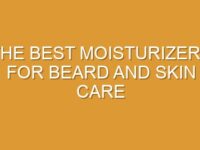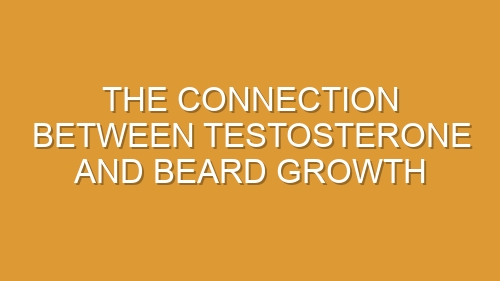-
Table of Contents
The Role of Testosterone in Beard Growth
The Connection Between Testosterone and Beard Growth
Have you ever wondered why some men can grow a thick, luscious beard while others struggle to grow even a few patches of facial hair? The answer lies in the hormone testosterone, which plays a crucial role in beard growth. In this article, we will explore the connection between testosterone and beard growth, shedding light on why some men are more blessed in the facial hair department than others.
To understand the role of testosterone in beard growth, it’s important to first grasp the basics of how facial hair develops. During puberty, the body undergoes various changes, including an increase in testosterone production. This surge in testosterone levels triggers the development of secondary sexual characteristics, such as facial hair. Testosterone acts as a catalyst, stimulating the hair follicles on the face to produce thicker and longer hair.
However, it’s not just the presence of testosterone that determines beard growth. The sensitivity of hair follicles to testosterone also plays a significant role. Some men have hair follicles that are more receptive to the hormone, resulting in faster and denser beard growth. On the other hand, men with less sensitive hair follicles may struggle to grow a full beard, even if their testosterone levels are within the normal range.
Genetics also come into play when it comes to beard growth. The genes inherited from our parents influence the number and sensitivity of hair follicles on our face. If your father or grandfather had a thick beard, chances are you will too. However, this doesn’t mean that men with less favorable genetics are doomed to a life without facial hair. While genetics set the foundation, testosterone levels and overall health can still influence beard growth to some extent.
Maintaining optimal testosterone levels is crucial for healthy beard growth. Testosterone not only stimulates hair follicles but also promotes the production of sebum, a natural oil that keeps the beard moisturized and nourished. Low testosterone levels can lead to dry and brittle facial hair, hindering its growth and overall appearance. Therefore, it’s important to maintain a healthy lifestyle, including regular exercise, a balanced diet, and sufficient sleep, to support testosterone production.
In some cases, men may experience a condition called hypogonadism, which is characterized by low testosterone levels. Hypogonadism can lead to sparse or patchy beard growth, among other symptoms. If you suspect that you have low testosterone levels, it’s essential to consult a healthcare professional who can conduct the necessary tests and provide appropriate treatment options.
In conclusion, testosterone plays a vital role in beard growth. It stimulates hair follicles, promotes the production of sebum, and influences the sensitivity of hair follicles to the hormone. While genetics and individual differences in hair follicle sensitivity also contribute to beard growth, maintaining optimal testosterone levels through a healthy lifestyle is crucial. So, if you’re looking to grow a luscious beard, take care of your testosterone levels and embrace your genetic predisposition.
Understanding the Link Between Testosterone Levels and Facial Hair
Have you ever wondered why some men can grow a full, thick beard while others struggle to grow even a few patches of facial hair? The answer lies in the hormone testosterone. Testosterone is a hormone that plays a crucial role in the development of male characteristics, including facial hair growth. In this article, we will explore the connection between testosterone and beard growth, helping you understand why some men are more blessed in the facial hair department than others.
To understand the link between testosterone levels and facial hair, it’s important to first grasp the basics of how facial hair grows. Facial hair growth is stimulated by androgens, a group of hormones that includes testosterone. Androgens are responsible for the development of male secondary sexual characteristics, such as a deeper voice, increased muscle mass, and, of course, facial hair.
During puberty, the body experiences an increase in testosterone production, which triggers the growth of facial hair. This surge in testosterone levels causes the hair follicles on the face to become more sensitive to androgens, leading to the growth of thicker and longer facial hair. This is why many boys start to notice the first signs of facial hair during their teenage years.
However, it’s important to note that testosterone alone is not the sole determinant of beard growth. Genetics also play a significant role. Some men are genetically predisposed to have higher levels of androgen receptors in their hair follicles, making them more responsive to testosterone. These individuals are more likely to have a thick, full beard.
On the other hand, men with lower levels of androgen receptors may struggle to grow facial hair, even if their testosterone levels are within the normal range. This is why some men may have sparse or patchy facial hair, despite having adequate testosterone levels.
Additionally, age can also affect beard growth. As men age, their testosterone levels naturally decline. This decrease in testosterone can lead to a reduction in facial hair growth. It’s not uncommon for older men to experience thinning or graying of their facial hair.
While testosterone is essential for beard growth, it’s important to note that simply increasing testosterone levels will not guarantee a luscious beard. There are many factors at play, including genetics and overall health. However, if you are concerned about your facial hair growth, it may be worth consulting with a healthcare professional who can assess your hormone levels and provide guidance.
In conclusion, testosterone is a key hormone that influences facial hair growth. During puberty, the surge in testosterone levels triggers the growth of facial hair. However, genetics and age also play a significant role in determining beard growth. Understanding the connection between testosterone and beard growth can help men better comprehend why some are more blessed in the facial hair department than others.
Exploring the Science Behind Testosterone’s Influence on Beard Development
Have you ever wondered why some men can grow a thick, luscious beard while others struggle to grow even a few patches of facial hair? The answer lies in the hormone testosterone. Testosterone is a key player in the development of male characteristics, and it plays a crucial role in beard growth.
To understand the connection between testosterone and beard growth, we need to delve into the science behind it. Testosterone is a hormone that is primarily produced in the testes, although it is also produced in smaller amounts by the adrenal glands. It is responsible for the development of male reproductive tissues and secondary sexual characteristics, such as muscle mass, deep voice, and, of course, facial hair.
During puberty, testosterone levels in boys increase significantly, triggering the development of facial hair. This increase in testosterone stimulates the hair follicles on the face, causing them to produce thicker and longer hair. The more testosterone a person has, the more likely they are to have a full, well-developed beard.
But testosterone alone is not enough to guarantee a full beard. The ability to grow a beard is also influenced by genetics. Some men have a genetic predisposition to grow a thick beard, while others may have genes that make it more difficult for them to grow facial hair. This is why you may have noticed that some men in your family have impressive beards while others struggle to grow any facial hair at all.
In addition to genetics, other factors can also affect beard growth. Age, for example, plays a role. Testosterone levels tend to peak in men during their late teens and early twenties, which is when many men experience the most significant beard growth. As men get older, testosterone levels naturally decline, which can lead to a decrease in beard growth.
Another factor that can influence beard growth is overall health. Poor nutrition, lack of sleep, and high levels of stress can all have a negative impact on testosterone production, which in turn can affect beard growth. So, if you’re looking to grow a beard, it’s important to take care of your overall health and well-being.
While testosterone is the primary hormone responsible for beard growth, it’s worth noting that other hormones also play a role. Dihydrotestosterone (DHT), a derivative of testosterone, is particularly important. DHT binds to receptors in the hair follicles, stimulating their growth and development. This is why some men may have high levels of testosterone but still struggle to grow a beard if they have low levels of DHT.
In conclusion, testosterone is the key hormone that influences beard growth. During puberty, increased testosterone levels stimulate the hair follicles on the face, leading to the development of facial hair. However, genetics, age, and overall health also play a role in determining the ability to grow a beard. So, if you’re looking to sport a full, glorious beard, take care of your health, embrace your genetics, and let testosterone do its magic.





















